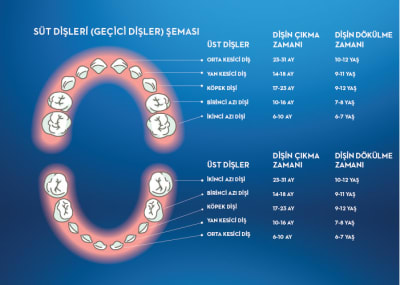Pediatric Dentistry

What is Pediatric Dentistry?
Pediatric Dentistry is the branch of dentistry that focuses on the healthy preservation of primary and permanent teeth in children, as well as addressing issues like decay and trauma that may arise with these teeth.
Pediatric Dentistry deals with children in the 0-12 age group. It is essential to consult a pediatric dentist as soon as possible when a child has any complaint or pain.
What is the Goal of Pediatric Dentistry?
Children have 20 milk teeth from 0 to 6 years of age. These teeth may cause symptoms like fever, loss of appetite, weakness, and itching, redness in the mouth while erupting. From 6-7 years, permanent teeth start to erupt into the mouth, continuing until the age of 12-13.
However, the priority is to ensure that milk teeth remain in the mouth in a healthy manner. Since milk teeth will eventually be replaced, there is a misconception among parents that intervention is not necessary. However, the decay or early loss of milk teeth can lead to misalignment of future permanent teeth and inadequate development of the jawbone.
Tooth decay is one of the most common chronic diseases in childhood. Untreated cavities can lead to pain and infections that can affect eating, speaking, playing, and learning.
The most important role in children's oral care belongs to the family. Awareness and oral hygiene habits should be encouraged from an early age. After the first tooth emerges, a dental check-up should not be neglected every 6 months.
The Importance of Fluoride for Child Patients
There is a common belief in our society that fluoride is harmful. However, when used correctly, it is impossible to ignore the benefits of fluoride. Fluoride converts hydroxyapatite crystals in the tooth structure into fluorapatite, making the teeth more resistant to acids and protecting them against cavities. According to the American Dental Association (ADA), parents should follow these instructions when their teeth start to erupt:
- Fluoridated toothpaste: For children younger than three years, parents and caregivers should begin brushing their children's teeth as soon as they come in with a grain of rice-sized amount of toothpaste. For children aged 3 to 6, a pea-sized amount can be used.
- Fluoride mouthwash: Add this extra step to their routine to combat cavities. It's best to start using it after six years of age.
- Fluoride supplements: When taken as tablets or drops, they can help protect teeth from the inside out. Ask your dentist for recommendations.
Conclusion
Pediatric Dentistry aims to ensure that children's oral health is maintained and that they grow up with healthy teeth and a beautiful smile. With proper education and regular check-ups, children can develop good oral hygiene habits that will last a lifetime.


